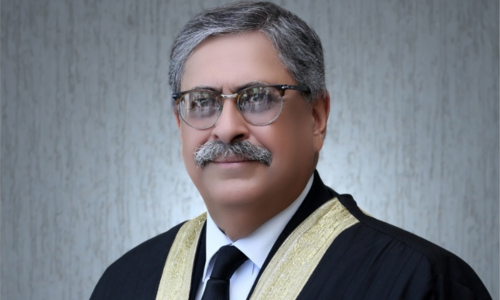ISLAMABAD: The Supreme Court has been asked to determine whether a missing person should be presumed dead after seven years of his disappearance if there is no evidence to prove that the individual is alive.
The controversy emerged after an appeal relating to an inheritance dispute was filed before the apex court. The focus of the dispute is an individual who has been missing since 1973.
The petition was moved this week by Raja Muhammad Anwar, a resident of Bhara Kaho, Islamabad, through his counsel Barrister Munawar Iqbal Duggal and Raja Mohammad Farooq to challenge a March 27, 2017, judgement of the Islamabad High Court (IHC).
The petitioner contended that when an adult Muslim has been missing for more than seven years, it is assumed that he is dead.
The petition questioned could Articles 123 and 124 of the Qanoon-i-Shahadat Order of 1984 be invoked or given preference over Section 2 of the West Pakistan Muslim Personal Law (Shariah application) Act of 1962 for the purpose of deciding the inheritance of a Muslim adult who has been missing. Under the law, all questions regarding succession should be decided according to the Muslim Personal Law if all the parties are Muslim.
Under Articles 123 and 124 of the Qanoon-i-Shahadat Order, it must be proved before a court that a person who was alive at any time over the last 30 years had actually died.
The controversy surfaced when Raja Mohammad Anwar, the petitioner, filed a suit before the court of senior judge (East) Islamabad on Sept 21, 2013, demanding that his brother Raja Mohammad Muzaffar Khan, who is missing since 1973, be declared dead under a provision known as Hukmi Maut (death announced by a court) and that his legal heirs be declared inheritors of his property.
But some defendants appeared before the court on Nov 20, 2013, and recorded statements to the effect that they had no objection if the court decreed that the property be divided among “all legal heirs”.
Some defendants never appeared and the court proceeded ex parte. The petitioner himself appeared as a witness and deposed that he was the only surviving legal heir of Raja Muzaffar, the missing person.
The trial court, through its judgement on Feb 21, 2015, held that the inheritance of the missing person had opened in 1980 and all the private defendants were declared legal heirs and entitled to receive their shares.
The petitioner challenged the order before the district judge (East) Islamabad, who modified the previous order on June 26, 2015, to the extent that the missing person was declared dead and that the estate of the deceased was opened for inheritance under the Hanafi law.
The case then went to a single-judge bench of the Islamabad High Court. It restored the February 2015 order of the trial court.
Through the appeal filed this week with the Supreme Court, the petitioner has contended that the high court had erred when the petitioner sought a declaration that his missing brother be declared dead under the Hukmi Maut rule.
The petition argued that the Islamabad High Court’s observation was unjustified and against the material on record when it held the onus was upon the petitioner under Articles 123 and 124 of the Qanoon-i-Shahadat to prove that Raja Muzaffar had died after the death of other legal heirs.
The petition contended that the IHC had failed to appreciate that there was no controversy in pleadings that the missing person was neither dead nor alive and keeping in view the fact that there was a presumption he was alive, it was incumbent upon the person who claims that Raja Muzaffar was dead, to prove the fact by evidence.
The applicant highlighted that the petitioner had argued before the high court that it was an admitted position of all parties that the missing person was neither dead nor alive; he was missing since 1973.
Therefore, the Qanoon-i-Shahadat Order of 1984 was not applicable in the present case and instead, the Sharia provision under the Hanafi jurisprudence would be operative, the petitioner argued.
Published in Dawn, January 1st, 2022














































